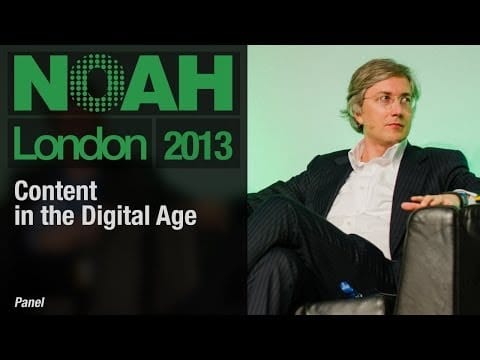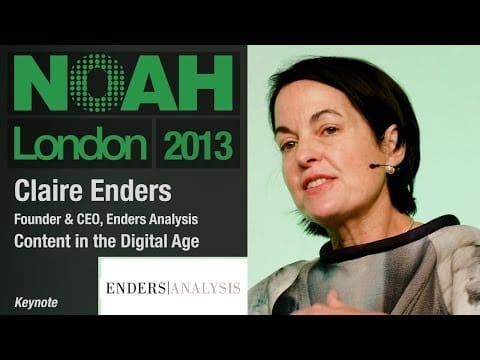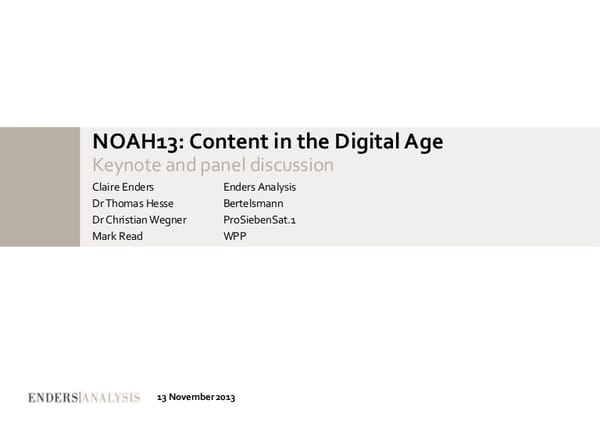Claire Enders- CEO, Enders Analysis
Claire Enders is a telecoms and media strategy analyst. During the past decade, Enders has built up an enviable reputation for outspoken and contrarian analysis of the prospects for technology, telecoms and media across Europe.




In the warren-like offices of Enders Analysis on the edge of Soho, central London, Claire Enders is laying into Ben Bradshaw. The new minister for culture, media and sport, she argues, is an "amateurish" figure, the kind of politician who doesn't understand that "every technological change results in both a gain and a loss to society". Neither is the doyenne of media analysts impressed by David Cameron's plans to curb Ofcom's powers. Handing back Ofcom's analytical role to Whitehall, she argues, would signal a return to "politicised decisions on regulation" - something she describes as "nuts".
During the past decade, Enders has built up an enviable reputation for outspoken and contrarian analysis of the prospects for technology, telecoms and media across Europe. "I'm not an advocate, I'm a sceptic," she says. "I try to figure out what's really going to happen."
Her track record is impressive. She predicted the advertising collapse of 2009; forecast that the Office of Fair Trading would scupper Project Kangaroo; and underlined problems with Setanta's business model from the start. One of her staff says her clients credit her with the ability to "see through the walls of boardrooms, and intuit the decisions they will make".
Enders herself admits to only one mistake of "Titanic" proportions - her prediction in 2001 that the music industry would get piracy under control by 2005. The error seems to genuinely pain her. It has not, however, blunted her confidence in a forecasting methodology that involves analysing massive quantities of data. Too many technology industry executives, she says, "advocate something that suits them, which is the destruction of traditional media models, so that all the money flows to them, even if it becomes pennies along the way". In this respect she is happy to argue that Steve Jobs of Apple is "full of bullshit".
Equally, Enders gives short shrift to the media bosses who didn't see change coming. She cites a series of debates with executives at the local newspaper chain Johnston Press in 2006. Enders's research suggested the beginnings of a deep structural modification. Tim Bowdler, the now retired head of Johnston Press, disagreed. Without a trace of triumphalism, Enders says that Bowdler has now "apologised for treating me like a lunatic".
Enders often becomes "a participant rather than just an observer" in big deals, says David Moody, director of strategy at BBC Worldwide. That appears to have been the case when DMGT sold its minority shareholding in GCap Media, the commercial radio operator, in early 2008. Enders says she "cudgelled" Viscount Rothermere into selling - against the wishes of the Daily Mail and General Trust's then chief executive, Charles Sinclair, who "felt that the sun would never set on traditional businesses" such as radio. Selling GCap, she adds, is "the only deal that's made any money for DMGT in the past few years".
So what is Enders predicting for a sector mired in recession? She recently forecast a return to growth for commercial TV in 2012 - two years later than many other analysts. In the case of national newspapers, she foresees a similar future. But there will be casualties: "We're going to end up, not far ahead, with a very small number of national newspapers."
For both radio and local newspapers, Enders sees continuing decline, even after economic recovery. Her company predicts that half the country's 1,300 local newspapers will close between now and 2013, destroying 20,000 media jobs. There will be "a decline of original content across the board that will have enormous consequences for democracy".
I wonder whether she finds anything positive to say about the darkest of her predictions - those involving local media - when she meets up with clients such as Rothermere."No," she answers swiftly. "Like fax machines and CD players, local newspapers and commercial radio are victims of change. These are long-term economic cycles." Such pessimism must make for interesting conversations between Enders and her husband, Christopher Thomson, chief executive of the local newspaper publisher DC Thomson.
The daughter of a US diplomat who prospered under Nixon and Reagan, Enders was one of the first female undergraduates to attend Yale in the 1970s. (According to one client, she remains committed to spotting "young women who are bright and really pushing their careers".) In 1997, she set up as an independent consultant, bankrolled by Anthony Bolton of Fidelity, one of Britain's best-known fund managers. It was her stance on the dotcom boom that made Enders's name: "When the bubble burst, people understood that I'd been saying something counterintuitive for a long time, which was that there wasn't a new economic paradigm."
Perhaps not. But when the bookseller Waterstone's asked for her advice on how to combat Amazon, Enders argued that it needn't bother. Amazon, she suggested, was unstoppable. Today, she offers similar advice to newspaper bosses. "They should stop looking and investing in the next thing," she says, "because they're wasting their capital."
In particular, Enders is critical of newspaper companies - including the Guardian Media Group (which publishes this newspaper), News International and Trinity Mirror - that have collectively spent hundreds of millions replacing printing presses. "Being tied down to fixed-cost equipment and fixed-cost staffing in an era where they cannot predict sales is crazy," she says. In Enders's view, the FT and the Telegraph Media Group have acted wisely in outsourcing their print work.
Enders may have been dismissive about the idea of a New Economy. But she is deadly serious about what she calls the virtual economy - a vast swath of activity, amounting to 20% of GDP, that stretches from Google's ad platforms to the giant IT companies that process government data. This virtual economy, Enders suggests, excels at "bargains, absolutely fantastic bargains, the like of which we've never seen before". But there is also a downside. "The growth of e-commerce and the decline of physical retail means that local economies are imploding."
Technology always diminishes human employment, Enders says. "We live in a world where all the innovation, all the value added since 2001, has been created in the form of algorithms. In our deflationary world, there are too many people and too much capacity, in almost every sector you look at, including government."
And 2001 was a significant year in other ways. According to Enders, it marked the point at which the correlation between economic growth and advertising growth broke down. It was also the last year in which the number of jobs sustained by the UK's private sector increased in net terms. "The private sector as a whole has been shrinking ever since," says Enders. In large parts of the country, she argues, government spending accounts for 60% to 70% of the local economy.
In 2004, Enders notes, local newspapers refused the suggestion that they should be regulated by Ofcom. Simultaneously, the government started withdrawing public sector advertising and the Royal Mail "eliminated distribution to homes". Enders believes these changes resulted in much of the decline of the regional press.
Is she suggesting a government conspiracy to destroy local newspapers? Not quite. But Enders maintains that she "went up and down the pike in 2004, very carefully ensuring that everyone in government, at all of the relevant levels, was aware of the potential effects of removing government advertising from the local press".
The response, she says, was a shrug. "The government believes the local press is read by people, middle-aged and older, who live local lives. They are not relevant to the government's view of itself.
"Instead of helping local media to stay alive longer, the effect of government action has been to push them over the edge faster. We're talking about a fourth estate that is facing the future with much fewer resources. The resources on the government side are overwhelming."
Getting sentimental about this, however, would involve becoming an advocate rather than a sceptic. That is something Enders would rather avoid. Change, she says, is what life is about. "You can measure it, but you really can't stop it."
Curriculum vitae
Age 51
Education L'Institut de l'Assomption, Paris; Yale University (BA, History); London Business School (MBA)
Career
1981 Alan Patricof Associates/Apax Partners
1984 Head of business development, Virgin Group
1986 Head of marketing, Superchannel
1989 Director of corporate entertainment, TVS Entertainment
1992 Corporate development manager, Thorn EMI
1997 Founder, Enders analysis
